|
|
|
Sort Order |
|
|
|
Items / Page
|
|
|
|
|
|
|
| Srl | Item |
| 1 |
ID:
144108
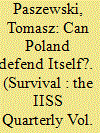

|
|
|
|
|
| Summary/Abstract |
Because of its steady insistence on the importance of NATO’s Article 5 and the credibility of security guarantees, Poland has long been perceived by its Western partners as a country whose focus on collective defence amounts to something of an obsession. One could argue that that obsession has now been vindicated by the Russian threat. Poland finds itself in the spotlight, and is expected to play a pivotal role on NATO’s threatened northeastern periphery.
|
|
|
|
|
|
|
|
|
|
|
|
|
|
|
|
| 2 |
ID:
144104
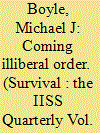

|
|
|
|
|
| Summary/Abstract |
In a July 2014 speech in Băile Tuşnad, Romania, recently re-elected Hungarian Prime Minister Viktor Orbán declared that it was time for Hungary to ‘abandon liberal methods and principles of organizing society’ and to embark upon a project of building a new ‘illiberal state’. Citing China, Russia, Singapore, India and Turkey as models, Orbán argued that the liberal-democratic model had performed poorly compared to authoritarian states and illiberal democracies during the financial crisis in 2008. Throughout that crisis, he noted, it was illiberal states – as he put it, ‘systems that are not Western, not liberal, not liberal democracies, maybe not even democracies’ – which proved more successful in responding to global economic turmoil. While he acknowledged that liberal values retained a degree of attractiveness, Orbán argued that it was important for states to cut themselves loose of the legal restrictions imposed by liberal democracy and to engage in a new type of economic nationalism to ensure that their interests were protected in the global economy.
|
|
|
|
|
|
|
|
|
|
|
|
|
|
|
|
| 3 |
ID:
144103


|
|
|
|
|
| Summary/Abstract |
In May 2015, the last border outpost between Syria and Iraq still controlled by the regime of President Bashar al-Assad fell to the mujahideen of the Islamic State.1 The Islamic State, also known as ISIS or ISIL, has long intended to erase what it claims are artificial boundaries, and to topple the ill-conceived states that mar the Arab world. It is not alone in that aim. From the Kurdish Democratic Union Party in Syria and Kurdistan Regional Government in Iraq, to the secessionist al-Hirak in southern Yemen and the Cyrenaican separatists in Libya, political actors across the region are mounting claims to states of their own. For the second time in a century, the map of the Arab world is on the brink of radical revision.
|
|
|
|
|
|
|
|
|
|
|
|
|
|
|
|
| 4 |
ID:
144112
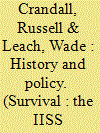

|
|
|
|
|
| Summary/Abstract |
Orange flames and smoke lit up Baghdad’s silhouetted skyline. It was 17 January 1991, and the Gulf War was finally under way. Five months earlier, in the early hours of 2 August 1990, Iraqi president Saddam Hussein’s forces had invaded Kuwait. After several days of deliberation and diplomacy, United States secretary of defense Dick Cheney and King Fahd of Saudi Arabia, meeting in the Kingdom, agreed that Washington would rush US forces to Saudi Arabia in order to prevent what appeared to be Saddam’s next conquest. For George H.W. Bush, this military response did not yet mean war. It was time, the US president and decorated Second World War veteran said on 5 August, to ‘push forward on diplomacy’. Yet, three days later, needing to convince a public and Congress fearful of any war’s protracted consequences, Bush’s tone had changed. For support, he turned to history: ‘Appeasement does not work … As was the case in the 1930s, we see in Saddam Hussein an aggressive dictator threatening his neighbors.’
|
|
|
|
|
|
|
|
|
|
|
|
|
|
|
|
| 5 |
ID:
144106


|
|
|
|
|
| Summary/Abstract |
A quietly important element of NATO’s Readiness Action Plan (RAP), agreed at the 2014 Wales Summit, is the Alliance’s need ‘to reinforce its eastern Allies through preparation of national infrastructure, such as airfields and ports’. Put simply, without the necessary infrastructure, including transportation networks and hubs, and energy supply lines, it will be difficult for NATO to preposition or sustain military units and ensure that the Very High Readiness Joint Task Force (or VJTF, also known as the ‘spearhead force’) is able to deploy within a few days. Yet the Alliance has limited collective financial means to modernise Europe’s defence transportation and supply links. The European Union, with its range of financial mechanisms, might be able to help.
|
|
|
|
|
|
|
|
|
|
|
|
|
|
|
|
| 6 |
ID:
144110
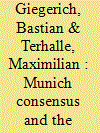

|
|
|
|
|
| Summary/Abstract |
In December 2015, Time chose German Chancellor Angela Merkel as its person of the year, calling her ‘Chancellor of the Free World’. A month earlier, The Economist had named her ‘the indispensable European’. The tendency to project outsized expectations onto the individual reflects a wider phenomenon: German economic and political power in Europe has grown, partly because Germany weathered the 2008 economic crisis relatively well, and partly because of the lethargy of other European powers, including France and the United Kingdom.
|
|
|
|
|
|
|
|
|
|
|
|
|
|
|
|
| 7 |
ID:
144107


|
|
|
|
|
| Summary/Abstract |
In NATO’s 2014 Wales Summit declaration, the members of the North Atlantic Alliance acknowledged that ‘Russia’s aggressive actions against Ukraine have fundamentally challenged our vision of a Europe whole, free, and at peace’. Signalling a renewed focus on Euro-Atlantic security, NATO decided to beef up its readiness and give collective defence greater emphasis in its longer-term strategy and defence posture. After a decade of out-of-area and crisis-response operations, demonstrating to allies and adversaries alike that NATO is willing and able to defend its members has become crucial for the credibility of the Alliance.
|
|
|
|
|
|
|
|
|
|
|
|
|
|
|
|
| 8 |
ID:
144109


|
|
|
|
|
| Summary/Abstract |
For Angela Merkel, 2015 was a year full of anniversaries. Europe’s longest-serving incumbent head of government celebrated a decade in power as Germany’s chancellor, and 15 years at the helm of her party, the Christian Democratic Union (CDU). Together with her fellow Germans, she also celebrated the quarter-century commemoration of her country’s peaceful reunification of East and West. And as Europe’s most influential leader, she observed how the Old Continent marked the 70th anniversary of Germany’s defeat on Victory in Europe (VE) Day, 8 May 1945, and remembered the end of the Second World War.
|
|
|
|
|
|
|
|
|
|
|
|
|
|
|
|
| 9 |
ID:
144105


|
|
|
|
|
| Summary/Abstract |
The Kurdish issue has been a problem for the Turkish Republic since its founding in the 1920s. With the onset of the Syrian conflict, that problem, from Ankara’s perspective, has taken on a new dynamic and become larger and more complex, because the Syrian Kurds have emerged as an important new actor. This has sounded alarm bells in Ankara about the establishment of an independent Kurdish state on Turkey’s southern border. Meanwhile, the collapse of the peace process between Turkey and the Kurdistan Workers’ Party (PKK) has sparked an upsurge of violence and a resumption of attacks against Turkish security forces that pose a serious threat to Turkey’s security, and to regional stability more broadly. Meanwhile, the military success of the Islamic State (also known as ISIS or ISIL) has sparked a major debate between Turkey and its Western allies, particularly the United States, over what should be given the highest priority: the defeat of ISIS, or the overthrow of Syrian President Bashar al-Assad.
|
|
|
|
|
|
|
|
|
|
|
|
|
|
|
|
| 10 |
ID:
144111
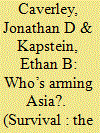

|
|
|
|
|
| Summary/Abstract |
In the international arms trade, as in any industry, market share is power. But unlike most other products, when it comes to the sale of weapons, power is not limited to economics. Arms exports not only benefit producers (and, sometimes, defence ministries) financially; they also cement relationships (often asymmetric, and occasionally coercive) between seller and client.
|
|
|
|
|
|
|
|
|
|
|
|
|
|
|
|
|
|
|
|
|